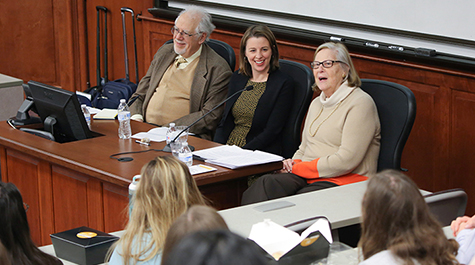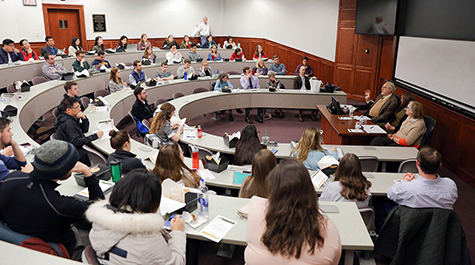Annual Koch Administrative Law Forum Examines President Trump and the Administrative State
On March 19, W&M Law School hosted the Koch Administrative Law Forum. The annual lecture series honors the legacy of Professor Charles H. Koch, an esteemed member of the William & Mary law faculty for 33 years who passed away in 2012.
Speakers included Sally Katzen, who served in the Clinton administration as head of the Office of Information of Regulatory Affairs (OIRA) at the Office of Management and Budget, as deputy assistant to the president for economic policy and deputy director of the National Economic Council, and then as the deputy director for management at OMB; and Peter L. Strauss, who was first general counsel of the US Nuclear Regulatory Commission and was an attorney in the Office of the Solicitor General.
In attendance was Denise Koch, who created the annual forum in honor of her late husband and who serves as an adjunct instructor at the Law School.
Professor Allison Orr Larsen, who served as moderator, asked the panelists a set of questions, leaving time at the end for questions from the audience.
Katzen began by setting the stage for the politics of regulation, and also defined OIRA for the audience.
“Everybody has fixed preconceptions about the administrative state,” Katzen said. “Regulations, which are the predominant way in which the administrative state manifests itself, have had good years and bad years depending on whether you’re pro-regulatory or anti-regulatory; no one is agnostic on this.”
Katzen described how every advance in benefits has led to pushback, as evident in increased desire for presidential control of the executive branch. President Reagan, for instance, wanted centralized review, which led to the deregulation that displaced agencies to whom Congress had delegated authority.
Strauss noted that the idea of OIRA has a lot of merit, but also potential pitfalls. He said that the process was public and transparent when agencies made administrative decisions, but over the past several decades, these same agencies have lost power to the White House, resulting in a process that is more political and less expert.
“The loss of focused responsibility, and with it the connection to the expertise the particular agencies have and the substitution for that of politics, is what gives me concern about the way in which rulemaking is trending,” Strauss said.
Larsen asked what is different about OIRA under President Trump than under earlier Republican presidents. Katzen said similarities included a strategy of appointing people to agencies who are hostile to those agencies. She cited, among others, Ann Gorsuch, the head of the EPA under President Ronald Reagan who wanted to dismantle the organization, and James Watt, Reagan’s Secretary of the Interior.
Among the biggest differences, Katzen said that President Reagan based his decisions on a valuable economic principle of cost-benefit analysis, whereas the Trump administration merely looks at cost analysis. Katzen said the latter “doesn’t swim in any economic pond.”
The standing-room-only, open-to-the-public lunchtime event was well received by students and guests. It also testifies to the late Professor Koch’s reputation in the world of administrative law, as far more people offer to participate each year as panelists than can be fit in to the event.
About William & Mary Law School
Thomas Jefferson founded William & Mary Law School in 1779 to train leaders for the new nation. Now in its third century, America's oldest law school continues its historic mission of educating citizen lawyers who are prepared both to lead and to serve.

